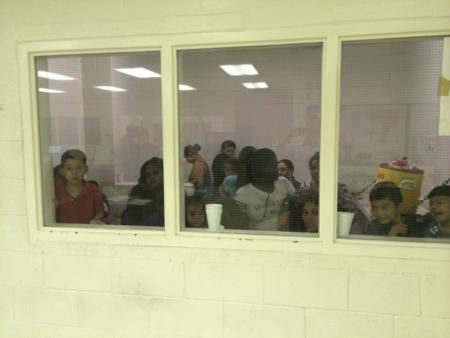Where Do You Stand?
It is an ancient story Jews and Christians have repeated through the ages. It goes to the heart of the Judeo-Christian understanding of the mercy of God as our protector, savior and our hope, and it began centuries ago in Egypt with the birth of a little boy. The boy was born into a Jewish family at a time when The Pharaoh was oppressing the Jewish slaves. He decided to kill all newborn boys. The mother, rather than face the death of her baby, placed the innocent child in a basket among the reeds of a river bank. The child was rescued and adopted by the daughter of Pharaoh and named Moses.
Tragically, in this new age, the story is being repeated as mothers send their children out of harm's way across the border to the United States. Most of the children are fleeing the violence born of destitution and poverty in Central America. San Pedro Sula, for example, is the second largest city in Honduras and the gang violence in some of the neighborhoods is such that parents know their child will be forced to join a gang or be killed.
For these poor families, leaving is the only way they see to a safer option. Thirty two children (under 18 years) were killed in Honduras in June alone. Sometimes the ages are under 10 years or less. World leaders, the United Nations and our own government desperately need to seek ways to work with the governments of Honduras, Guatemala, and El Salvador, the countries from which the majority of children are fleeing, to address the root causes of this exodus. But in the meantime, we must also respond to the needs of those crossing our borders for safe refuge.
Here in the US, the Catholic Bishops are asking citizens to urge Congress to act in compassionate ways within laws and funding levels to protect unaccompanied children who are fleeing the violence and seeking refuge in this country. More details about how each of us can act are at www.justiceforimmigrants.org. I hope you will refer to them and choose to act on them.
The questions of immigration have long been a challenge for this young nation. Our forbearers arrived here from their homelands seeking a better life and often escaping dire poverty and suffering. As we all know they found opportunities, and through hard work and determination, yoked with faith and family, success was all but guaranteed. I do not think today's immigrants are much different from my grandfather. However the moral, religious, ethical and political climate has changed significantly.
Now we have allowed fear to enter and define so much of our response. It is fear of our capacity to receive others, of their needs and our resources, of their differences in language, culture and religion, of the political implications one way or another. We are suspicious of the motives of the new arrivals, fearing we are being taken advantage of and fearful their entry will mean less (somehow) for us.
How is it that fear has been allowed to be a determining factor in these matters? What happened to faith? What happened to charity, kindness and respect for the dignity of another who is suffering? Since when has our responsibility to be our "brother's keeper" been replaced by suspicion and fear that our brother's needs are his fault and his problem -- alone?
The faith traditions of our time call on all to receive the stranger with thoughtful kindness. Jesus continually emphasized the responsibility to care for the widow and orphan (the weakest and most in need in the community). The current debate of how our nation ought to respond is exposing an ugly underbelly of a nation turning inward in fear and selfishness.
The issues at hand are daunting. They are huge and overcoming them will be a real challenge. Being afraid of them is an unworthy response from a great people with a tradition of generosity and goodness. We can do better and many states, like our own, are seeking to be involved with effective responses.
I intend to get involved and I urge you to as well, for I cannot overlook Jesus' evocative words, "Truly I say to you, as you did it to one of the least of my brethren you did it to me" (Mt. 25:30).
Father Ronan is Pastor of Saint Mary - Saint Catherine of Siena Parish in Charlestown, Mass.



















